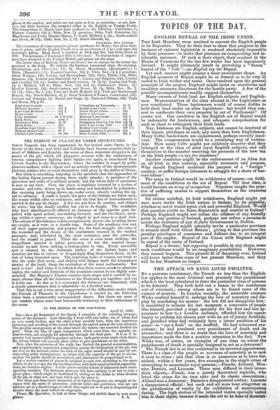THE PURSUIT OF PLEASURE UNDER DIFFICULTIES.
SINCE Tragedy has been supplanted by her lyrical sister Opera in the favour of the town, and Grisi and Lablache have become popular idols in- stead of Siddons and Kemble the scene of those desperate struggles in the passes of the pit, which old playgoers recount with the enthusiasm of veteran campaigners fighting their battles o'er again, is transferred from Covent Garden to the Haymarket; where the warfare is waged by polite pleasure-seekers, with a vigour and an activity worthy of the most energetic plebeian pittites who covered themselves with glory in the defiles of Drury. But there is something imposing in the spectacle that the approaches of the Italiau Opera present during these night attacks: it partakes of the splendour and order of a military assault, and the whole field of operations is seen at one view. First, the place is regularly invested by a cordon of coaches and cabs, drawn up in battle-array and marshalled by policemen; the storming party being drawn up, under cover, silently waiting the sig- nal to advance. A crash is heard; the gates of the fortress are burst open; the troops within offer no resistance, and the first line of intrenchments is carried at the pas de charge. A few are put hors de combat, and obliged to retire; but the deadly conflict has yet to be fought. The assailants, who have simultaneously effected an entrance at the opposite gate; im- pelled with equal ardour, are rushing forward; and the two forces, meet- ing within a narrow causeway, are wedged in and come to a dead lock. The science of the defences is here conspicuously shown: the invading forces are caught, as it were, in a double trap. Some of the assailants now cast off their upper garments, and prepare for the final struggle: the cries of the wounded and the shouts of the combatants resound in the vaulted passages; and, infuriated by the stout resistance, pass the outworks, and the citadel is gained. There the scene is even more striking: the magnificent interior is taken possession of, but the wearied troops wander up and down seeking a resting-place in vain. Every accessible spot is secured by the fortunate leaders of the forlorn hope; and numbers are fain to retreat, or despairingly fling themselves down, at the risk of being trampled upon. The imploring looks of women, too weak to win the seats they covet, and sinking with fatigue amid the triumphant strains of the band, damp the exultation of the most enthusiastic. But such is war! And when it is reflected that these scenes occult on alternate nights, the valour and fortitude of the assailants cannot be too highly com- mended. Her Majesty's Theatre sustains more sieges and is carried by as- sault oftener than all the fortresses in the Peninsula put together; and yet it holds out. As fast as it is evacuated the defences are reinstated, with a steady perseverance that is admirable—in a fortified town.
That this is not a very great exaggeration of the difficulties under which the Pursuit of Pleasure at the Operahouse is carried on, the following letter from a trustworthy correspondent shows. But there are some of our readers whose scars bear honourable testimony to their enthusiasm in the cause.
TO THE EDITOR OP THE SPECTATOR.
April 21, 1846.
Sra—As a pit frequenter of the Opera, I complain of the crushing arrange- ments of the entrance. Last Saturday I went with two ladies, one of whom had an arm nearly broken, and the other a foot severely hurt, from the impetuous thronging and crushing of the crowd through the narrow pass at the very entrance. The peculiar arrangement at the place where the tickets are received doubled the peril. There the files of eager competitors which come from the opposite en- trances meet, and struggle for admission through the final pass. It is as if in- genuity had exerted it.f to produce collision; each party must needs clash there; the throng behind will scarcely allow either to give precedence to the other. Now, since the extension of the stalls has limited the general accommodation, and proportionately augmented competition among the frequenters of the pit, who are ever on the increase, either the rush of the eager crowd should be met by cor- responding police arrangements, or, better still, the capacity of the pit to accom- modate the public should be ascertained, and admissions be proportioned to it. Let a certain number of places be assigned to each row, according to the space which, on the average, the human dimensions' with their usual artistical augments fleas, are found to require. Let the places and the tickets of admission have corre- sponding numbers. The fortunate possessor will have nothing to do but to seek a given pm; which might be facilitated by stating on the ticket in what division of the pa, in what row, and near which end, the place is. The dress and demeanour demanded of an Opera frequenter are strongly at va- riance with his mode of admission: delicate ladies and gentlemen who are not athletes are at a disadvantage to which they ought not to be put in frequenting the theatre where the most refined do congregate.
Please, Mr. Specta/or, to look at these things, and abolish them by your stern


























 Previous page
Previous page